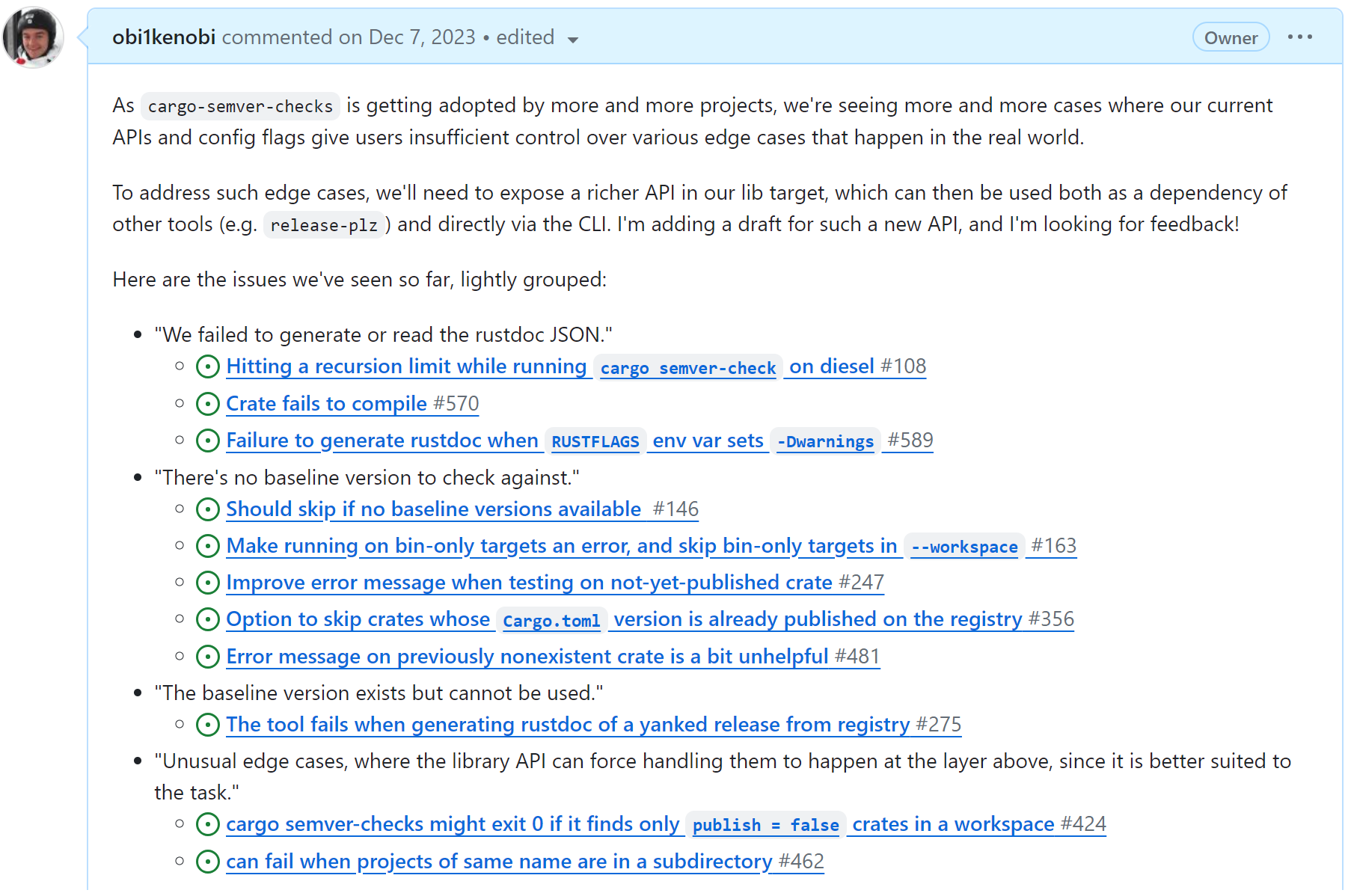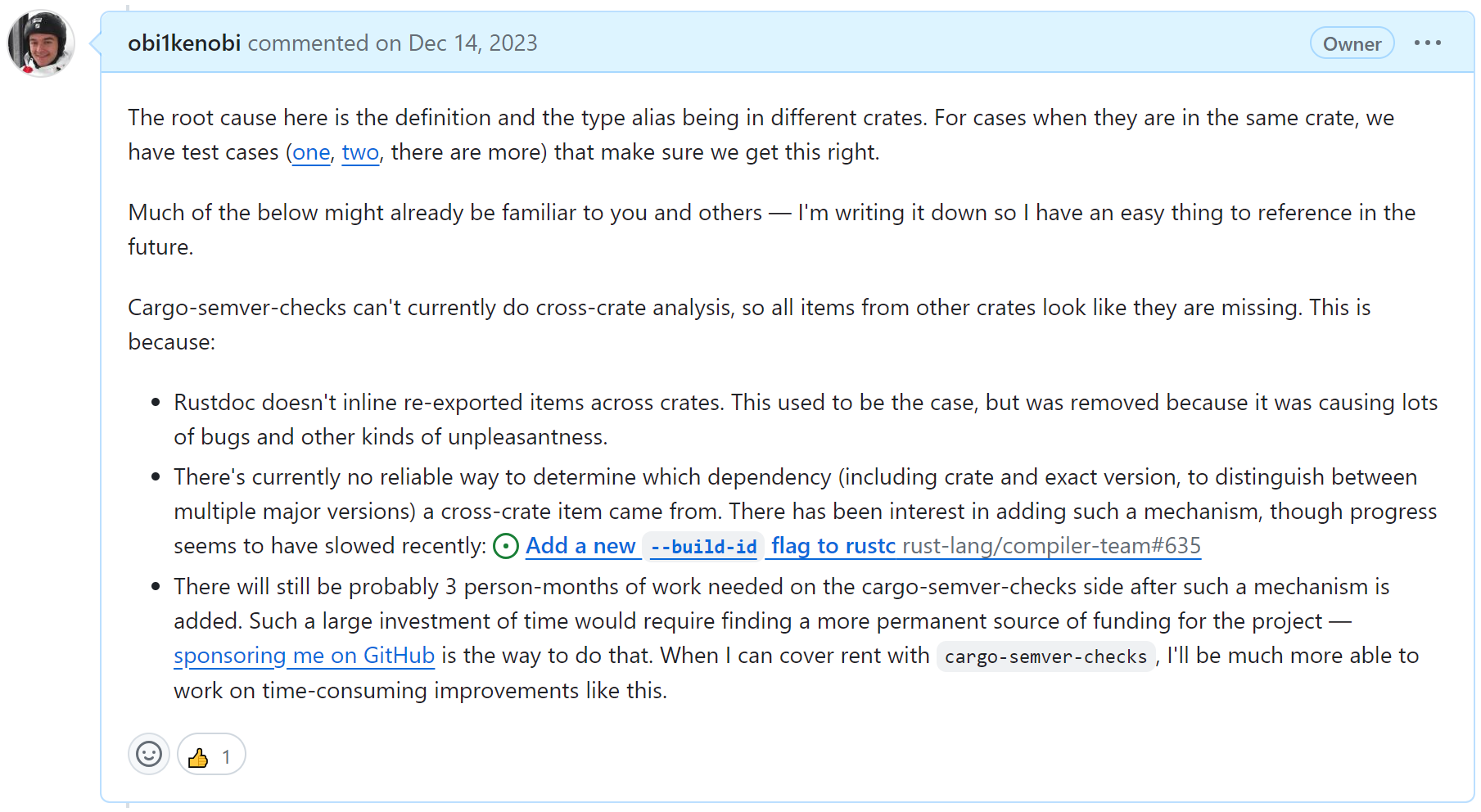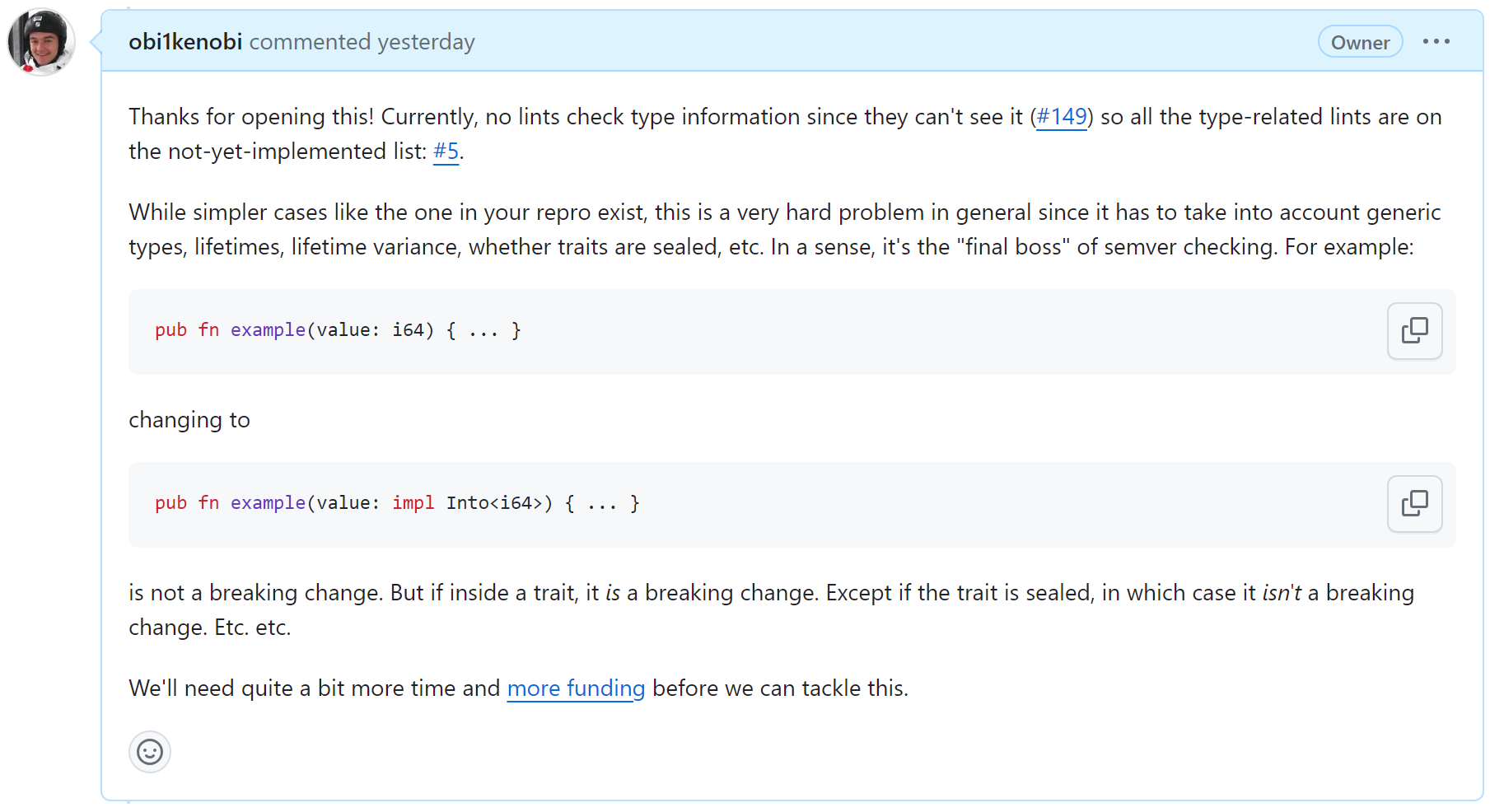My last post covered the key cargo-semver-checks achievements from 2023. Here are the biggest challenges that lie ahead!
Many of the remaining challenges in cargo-semver-checks are obvious: we all want more lints, fewer false-positives, etc. etc. Let's set those aside.
Instead, let's talk about four non-obvious challenges we have yet to tackle:
Discuss this post on r/rust or lobste.rs. Subscribe to future posts.
Obvious in retrospect — Project edge cases
In theory, cargo-semver-checks is simple: for each crate being scanned, grab an appropriate prior version, diff it against the current source code to find breaking changes.
In practice, that sentence glosses over an unbelievable number of edge cases. It would only become accurate if we put* footnotes* next* to* each* word*. Not real footnotes, just a narrative aid. "Diff the source code to find breaking changes" sounds like it would be the hardest part — but in practice, that's the only straightforward bit!
Here are some of the edge cases we may run into before starting any semver checking:

When I started cargo-semver-checks, the priority was getting the tool working at all. I didn't have time to consider, nor could I have imagined, the vast space of possible edge cases.
In retrospect, many of them seem obvious. In 2024, we should tackle them.
Blocked upstream — Cross-crate analysis
cargo-semver-checks currently analyzes crates independently, without looking at their dependencies. It never sees any data for items defined in dependencies, even if those items are part of the checked crate's public API. It's as if the foreign items simply don't exist.
Most of the time, this is fine! Many people still use cargo-semver-checks despite this limitation.
But cross-crate analysis is the top cause of false-positives in cargo-semver-checks today. In our ecosystem-wide semver study, it came in second only to the false-positives caused by #[doc(hidden)] handling — which are no longer an issue as of our v0.25 release.
In fact, it causes both false positives
Say you move a type to another crate, then re-export it in its original location. This falsely looks like a deletion: the re-export references some unresolved (missing) item and we cannot determine if it's the same type or not.
and false negatives.
One example is if your crate has a re-export of another crate's item, and the re-export gets deleted or stops being pub. Since the re-export seemed to point to an unresolved (missing) item, cargo-semver-checks would have discarded it as non-analyzable before realizing that it was deleted.
So why haven't we fixed it yet?
While cargo-semver-checks could be better at handling the downstream symptoms, any solution that tackles all edge cases will require new functionality in both rustc and rustdoc:

Surprising limitation — No checking of types
Changing the type of a public function's parameters is an obvious breaking change. Surely?
A precise and correct answer needs another* thousand* footnotes*. Still not real footnotes. It hinges on understanding dark corners of the Rust language (e.g. type coercions, or lifetime subtyping and variance) as well as community-designed gadgets like sealed traits that aren't official language featues (yet?) but are nevertheless commonly used in real-world Rust.

cargo-semver-checks. Screenshot from this GitHub issue.
It's not all doom and gloom, though! I'm positive this is doable, the only question is what's the best way to do it.
The process here is going to be analogous to how I've been working on extending our trait-checking capabilities:
- I found that correct trait semver-checks depend on accurately detecting whether a trait is sealed — meaning that it may not be implemented outside of the trait's own crate.
- I did extensive research on the various ways to seal traits, which turned out to be a broad topic! I couldn't find any singular resource that covered all the details, so I wrote it myself. Since then, I've learned a few even more advanced trait-sealing techniques. This GitHub issue has more details — it might be time for a follow-up post though!
- Then, I started working with the
rustdoc-jsonmaintainers toward removing roadblocks and making this feature easier to implement and maintain. - In the meantime, I've come up with a sketch for representing trait-sealing info in the schema that powers the
cargo-semver-checkslint queries.
Which brings us to the next challenge...
Existential threat — Sustainable project funding
I'm not employed by any company to work on Rust or cargo-semver-checks. Instead, I'm trying to become a professional open-source maintainer.
I'm deeply grateful to every single one of my GitHub sponsors. Many of you are donating out of your own pocket 🙏 And behind each company that sponsors me are individuals who advocated for me to their company 🙏 I appreciate it more than I can describe!
Unfortunately, the current funding situation is far from sustainable.
The bottom line is this: all the sponsorships I've received for cargo-semver-checks in total would cover one week of my usual consulting fee.
Either I manage to figure out how to get more recurring funding to support my family, or I eventually join the list of burned out maintainers who had to make the difficult choice to abandon the projects they care so deeply about.
The recent post on burnout in the Rust project hit quite close to home. We all know this problem goes well beyond just Rust itself.
I love cargo-semver-checks, and I'm blessed to have an extremely supportive family, but on our current trajectory either our savings or their near-infinite patience will run out.
The best person to help is — you, dear reader.
- If you work at a company that uses
cargo-semver-checks, please ask them to support its development. - If you aren't sure how to approach that conversation, reach out and I'll help you through it!
- If you're an experienced professional open-source maintainer who's made the system work — I'd love to learn from you!
Discuss this post on r/rust or lobste.rs. Subscribe to future posts.